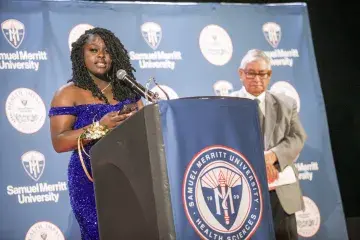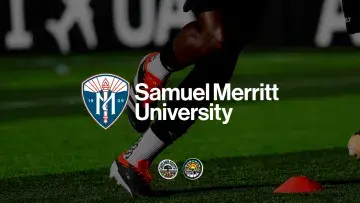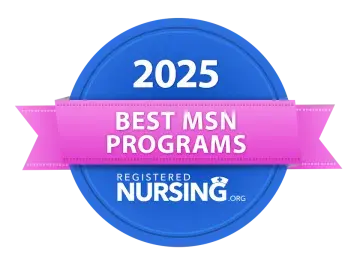Students Head to CGIU to Present Anti-Tooth Decay Project
During her public health clinical rotation, Rachel Mathison noticed a young boy with gray teeth.
The discoloration in the boy’s mouth was a symptom of tooth decay, and the observation left a deep imprint on Mathison, an RN to BSN student at Samuel Merritt University (SMU).
“He was just too young to already have this disease,” Mathison said. “It leads to so many other problems down the road.”
Mathison hit the books and learned that tooth decay — although preventable — is the most common childhood disease in the U.S. and impacts more kids who live in underserved communities. Left untreated, the disease can impact nutritional intake, self-confidence, school performance, and a host of physical and psychosocial issues.
Children in Alameda County, where Mathison’s daughter attends school, experience twice the level of urgent dental care needs compared to kids in other counties throughout California.
All of the stark research led Mathison and two fellow SMU nursing students to develop an oral hygiene education campaign aimed at kids and parents in underserved schools, which they will present at the Clinton Global Initiative University (CGIU) in October. President Bill Clinton launched CGIU in 2007, modeled after his successful Clinton Global Initiative, to inspire college students “to develop innovative solutions to pressing global challenges.”
This year’s event, held in Boston, is the second consecutive year students from SMU were invited to share their plans to improve health outcomes in overlooked populations. Last year's SMU student presenters Carmen Craven, Nga Dwork, and Shante Myers are now alumni graduate nursing students from SMU’s Sacramento Campus; they were invited back to CGIU this year to reintroduce their plan to address the shortage of culturally diverse healthcare professionals and decrease the readiness gap that exists for lower-income students.
“Since I’ve been enrolled in the RN to BSN program I’ve been looking at public health and policy in a new way,” said Mathison, who works in the neonatal intensive care unit at Kaiser Permanente in Oakland. “I’m passionate about reducing health disparities, and this is one way I can help.”
Joined by Ashley Rico, a student in the Family Nurse Practitioner program, and Courtenay Gonzalez, a recent Bachelor of Science in Nursing graduate, the trio developed Health-by-Three, which breaks down oral health strategies into three easy steps for kids and parents.
“A lot of this is generational,” Mathison said. “Some kids, especially if they’re growing up in poverty, don’t learn or simply aren’t aware that brushing their teeth every day is good for their health.”
Health-by-Three is designed for providers to deliver three simple messages to children in their classroom: 1. Eat healthy food. 2. Drink tap water. 3. Brush and floss. The kids keep dental logs that chart their daily progress.
In the fall, Mathison, Rico, and Gonzalez will start working with a pilot school in San Leandro.
“We want to empower kids,” Mathison said, “and get them into self-care habits at an early age.”


